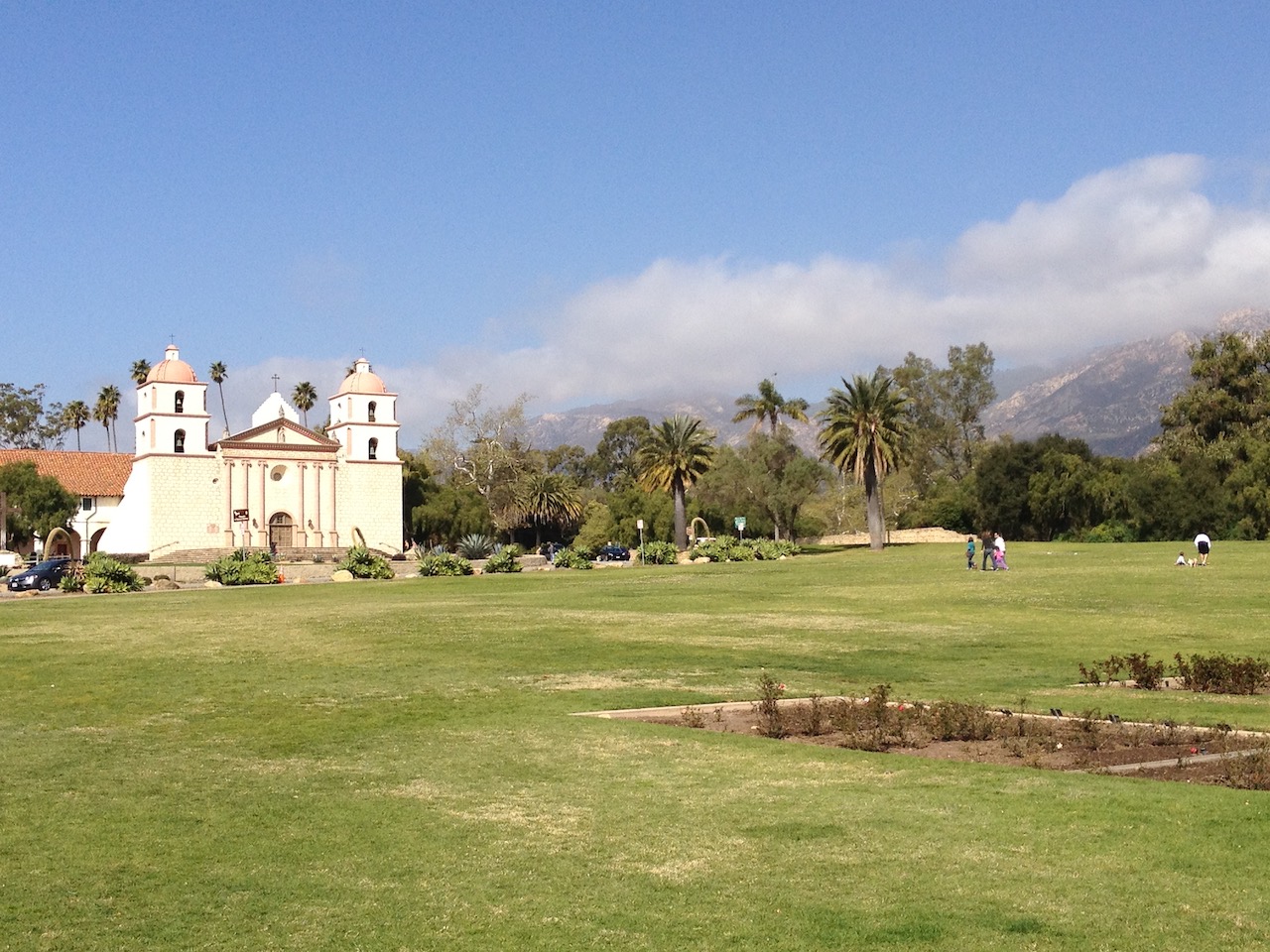By Keith C. Milne
**The actual names of my relatives in this post have been changed for both their privacy, and mine.
My ancestors came to America hoping to cash in on what they perceived to be a better opportunity for personal and financial freedom than they could ever have hoped to enjoy in Europe. None of my ancestors were wealthy business barons or rich land owners while living in Europe, they were just simple, honest, working class people who were feeling limited in Europe where commercial scale culture was already dominant. They perceived America as a very large country that held plenty of opportunities for people with dreams about having a better life than they had known in Europe.
On my mother’s side, Maria and Rafael came from Spain hoping for a better life during the late 1800’s. They came through Ellis Island and quickly decided that life would be better in southern California after learning about Santa Barbara’s Mediterranean climate, which was very much like they were used to in Spain. Moving to Santa Barbara allowed them to be near the Spanish speaking population, and to be near people with a similar cultural background. Unfortunately, beyond this, most of my family’s history on my mother’s side wasn’t passed down or shared. Most of my relatives, on this side of my family, moved elsewhere in an attempt to find better jobs and lost touch with each other over the years.
This illustrates how easily the profit motive of large companies can create fierce competition for jobs that quite often fragment families. It is just one of the methods of coercion in getting workers to submit to unfair labor practices, weakening their will to fight for fairness utilizing a “divide and conquer” strategy.
Maintaining ties with family was also very important to my relatives on my father’s side. My great, great, grandparents on my father’s side, Johan and Kirsten, valued, and wanted to have an extended family, while maintaining close ties with other people who shared a similar language and cultural background. It was a method of survival that they successfully used in Europe, and they brought this value with them when they came to America from Denmark in 1883. They originally homesteaded in Wisconsin, but in 1908, they pulled up all of their stakes, moving their 7 children and all of their belongings to Dagmar, Montana because they had learned about a Danish community that had begun to form there. Once they arrived in Montana, Johan and Kirsten met Nicolai and Petra, who were already in Dagmar after a similar migration from Denmark. Eventually, their son Christian married my great grandmother Karen. Together they staked out some land for themselves and farmed Durham wheat, while raising a very large family of 8. As Lutherans, they were strong believers in the bible and in being “fruitful and multiplying.” Their large family size is one example of how commercial scale culture taps into the protestant work ethic.
Having a large family was a sign of status during this time period. It not only symbolized that you had plenty if you could afford to raise such a large group, but my family in Montana, along with many other farmers, also had large families for strictly utilitarian purposes–cheap labor. However, it was also utilitarian from a commercial scale cultural perspective, it provided a continuously expanding consumer base, and provided laborers who left their farms for the cities.
The seeds of financialization were already being sown in the big cities like New York through the formation of the New York Stock Exchange. Speculation in the market during this time fueled by a belief in, and the practice of, laissez-faire economics, set the stage for the huge stock market crash and depression that followed. Many of the farmers in Montana and elsewhere lost their entire stakes during this crisis.
My great grandparents managed to hang onto what they had, but had to sell off a substantial portion of their holdings in order to achieve this. Some of the farmers near them were using newly developed agricultural machines based on fossil fuels, and were not hit as hard because they had already managed to raise a larger surplus with less effort, and bought up some of the smaller farms. These became the future “super farms,” or corporate growers. Eventually, my great grandparents, and many of the other farmers around Dagmar, were discouraging their children from continuing to farm, actually urging them to look for better employment elsewhere. Dagmar, according to my grandmother Elaine, used to be a thriving community with many schools and churches and a beautiful downtown. The children began to leave in droves, the population decreased fairly rapidly, and so did the tax base. That translated into less economic activity and vitality, and the town shrunk with more businesses and schools closing. Dagmar is now a mere shadow of its peak reached between 1900–1945. This event illustrates that, even in rural farming communities there was, and there still is, a dependence on commerce for survival. My grandmother left Dagmar for California after getting a letter from a former schoolmate who told her about an upcoming job opening in Santa Barbara.

Commercial scale culture makes people totally dependent upon money by turning everything into a commodity that can be bought and sold. Everyone who comes to America, or who has lived in a similar situation, or is born into this type of system, quickly learns this. Commercial scale culture in America fueled the desire of many people to be able to produce things cheaper and faster, and to reduce production costs, thereby increasing profit margins. This desire was the precursor to the industrial revolution, which churned out more machinery, and products. All of this new machinery needed oil to lubricate it, and fuel it. This need was greatly exacerbated by the advent of the automobile, which created a demand for oil that no one had previously seen before. Back then, Oil was gold, as it is now, and some of my relatives decided that they weren’t going to be left out of any of the potential wealth this boom was creating.
So, while my grandmother’s grandparents and parents were settling and farming in Montana, my grandfather Elias’s grandparent’s, on his father’s side, had migrated from Scotland in the late 1800’s coming to California in search of some of that oil. My great, great grandfather Johan, and his son, Johan Jr., bought up property along the California coast from Goleta (just north of Santa Barbara), north to Refugio Beach believing that it contained oil. The land was cheap and everyone thought that they were crazy to buy any of it. Johan Jr. also ran a gas station in Santa Barbara. He never was very successful at finding oil on any of the property that he had purchased or inherited from his father, and when he got older he sold it to one of the large oil companies that did eventually manage to extract oil from some of his land using more technologically advanced techniques.
My grandfather’s grandparents on his mother’s side, Aaron and Lidia were English. My great, great, grandfather, Aaron, came to America around 1870 via Ellis Island, leaving his wife, Lidia, in England until he could evaluate America and decide where to live before sending for her. My grandmother, Elaine, has a bundle of his letters, and she told me about his trip. He came across America by wagon, and while in Arizona, was caught up in a war with some native Americans during which an arrow pierced his hat. Once in California, he fell in love with Santa Barbara, and decided that it was the right place to settle. He sent for Lidia and his daughter, Agnes, my great grandmother, who was only three years old at the time. Aaron feared that they would never be able to endure the trip he had just taken, so he decided that they should take the long way, going around Cape Horn, South America.
He was a skilled carpenter and later became an equally skilled aviator. In 1880 he built a house in Santa Barbara that he sold to my grandparents for almost nothing as a wedding present before moving to San Francisco. My grandmother raised all of her children in that house, and celebrated over sixty Christmas family gatherings in that house. It is interesting to me that her house was built before the street existed, so a current visitor has to take a few steps to go down into her front yard, and it is the only house on the street like that. When the City of Santa Barbara built the street they elevated it, so all of the other houses built on her street are at the new elevation.
For the next generation in my family, my grandparents, life was a real transition period. Their upbringing, reinforced by their experiences growing up during the depression, as well as how things were during World War II, only reinforced their already strong belief in the importance of hard work. They were very grateful for what they had.
This is precisely what corporate America needed, wanted, and loved. It allowed them to expand, and gain even more power than they already had. It provided them with the capital they needed to continue to expand across the nation and globally. There is nothing like a depression and a world war to throw fear into millions of people. Fear that would last a long time. As long as those memories lived, so would a nose-to-the-grindstone attitude amongst the people.
Now, a multitude of new, technologically advanced products were being pumped into our culture. This created a sense of want in our nation, and there were many things to want now. Appliances, like washing machines, electric mixers, radios, and telephones, became must haves. Once television arrived, America fell in love with it instantly. Owning a television was a sign of financial success and status, and it was the perfect tool for corporate America to use for keeping people wanting more. Companies could now instantly beam the images of their products into the television sets of all the consumers that were now gathering in front of their televisions by the millions to watch. This device, along with the automobile, were, in my opinion, the two inventions that did more to benefit modern commercial scale culture’s agenda than any others. People were now willing to work harder than ever to own more of the miracle devices that were being marketed to them, and my family was no exception.
My grandmother, Elaine, and all her siblings had all left the farm in Montana for greener pastures–namely work–wherever they could find it. My grandfather, Elijah, and my grandmother Elaine, on my father’s side, raised a large family in the previously mentioned house that was built by my great, great, grandfather Alfred in Santa Barbara. My grandfather was a foreman who worked for the city sanitation department. My grandmother babysat, ironed for people, and eventually went to work for a local elementary school selling lunch tickets to students, a job that she retired from at the young age of 84.
My grandfather on my mother’s side, Benjamin, was a commercial fisherman who harvested Bonita in the then rich fishing waters off of the southern California coastline. My grandmother, Marge, worked as a clerical person for the City of Santa Barbara for many years, eventually retiring from that position. Already, the more traditional industries like farming and fishing were being concentrated into the hands of fewer and fewer people. The number of farms were shrinking, with those that remained getting bigger. Many of the small farms in the central valley of California were being consolidated into large mega-farms that grew for corporations like Green Giant, Libby’s, and Del Monte. My grandfather eventually had to sell his boat and fishing equipment when he could no longer compete with some of the corporate fishing outfits that engaged in large drift-netting operations. He was never the same man after that. He fought alcoholism and unemployment the best that he could, but eventually lost his life to alcohol.
As stated earlier, my other grandparents were employed in local government positions and remained there all of their working lives because they were secure jobs that provided benefits never previously enjoyed by most of working America, which provided them with a comfortable middle class existence. Many similar jobs were created by the federal government during World War II, and during the Korean conflict, earning them the reputation for being good jobs for working class people who did not necessarily have, or need a college background.
My father’s and mother’s generation were the first to be influenced in a significant way by television, along with far more technology than any previous generation, and that trend has only accelerated. My parents, and their siblings, all bought into consumerism more than any previous generation. They grew up wanting to have it all, just like everyone else. They, too, wanted to achieve the “American dream” of marriage with kids, home ownership, and all the toys that money could provide. They were extremely patriotic, as well, and believed that America could do no wrong. A popular motto during their early adulthood years, the 1960’s, was, “America, love it or leave it.”
Conformity to social norms and conventions took precedence. However, there was much social unrest beginning to be felt, and this instability increasingly unfolded as the 1960’s progressed. Racial inequality was becoming intolerable. Riots broke out in the South, in Washington D.C., and in the Watts section of Los Angeles. Women were growing weary of being second class citizens, and the Vietnam war began. People were getting fed up with the status quo, and of the rigid conformity that prevailed during this time period.

Corporate America sold the country on a plastic, phony, ideal of success, via television using unprecedented advertising. Social unrest over Vietnam and the ecological consequences of our “advanced” culture began to emerge. Many young people and college students were protesting, and some began dropping out, dropping acid, and smoking marijuana. Finally, divorce became prominent in America, profoundly affecting my family.
The climbing divorce rate was caused, in part, by the whole movement to change the status quo just mentioned during the 1960’s. However, divorce became even more prevalent during the 1970’s as many corporations continued their consolidation, becoming very powerful transnational companies. Their activities directly added to this familial crisis by raising the price of goods and services repeatedly. Without getting into all the economics that would normally accompany such a claim, let me just say that I don’t entirely buy into the theory that heavy consumer demand solely created the high, double-digit inflation that took place during the 1970’s. Other large contributors to high inflation: the now-proven-bogus energy shortage that caused the price of gasoline to double. Additionally, housing costs were rising exponentially, along with interest rates, along with the cost of food.
These large price increases created additional capital which was then used by corporations to pay for much of their global expansion efforts. The financial “crunch” this created for American families steadily forced more mothers, including mine, and the mothers of the households of most of my relatives, to go to work so that our family’s current lifestyle could be maintained. This added major stress and instability to my household, and the households of millions of other people. The effect of this additional, but significant financial stress was a huge contributing factor, eventually ending in the divorce of my parents, and all of their siblings, and had a long-lasting negative effect on my siblings and me, and many of the families of our friends. At times, I have looked back at the familial carnage that resulted from my parents getting divorced, and have also reflected on the wreckage that my cousins experienced when their parents divorced. This was a very sad chapter in my family’s history, and in the history of our country. The divorce rate steadily climbed to 50% and has remained at this mark ever since.
The financial crunch continued into the 1980’s getting even worse for some with Reagan’s “trickle down economics,” which didn’t work then, nor has it ever worked for those who’ve touted the logical benefits of trickle down economic theory. Sounds grand, seems to make perfect sense but, unfortunately, the trickle downward part never actually occurs.
Now, there is no way for a family to survive and live a middle class existence unless both adults in the family work full-time. This new development which put the American family in a vise, created whole generations of “latch-key kids,” and children being raised without proper interaction with, and supervision by adults. Drug use and juvenile crime became prevalent, (affecting me and many of my friends) along with a corresponding rise in the incidence of gangs as a substitute for family across America.

Growing up in my family meant having to constantly relocate while my mom chased gainful employment, and the cost of living steadily increased. We were always one paycheck away from a financial meltdown. Now, this seems to be the norm for many in my family. Everyone is too busy working to get together, write letters, or even phone each other very often, if at all. Even texts are often ignored.
We are spread out all over the western states, with me here in Massachusetts. Family reunions became more scarce as ties weakened from relatives being away from each other for longer and longer periods of time. That, in turn, diminished the importance of having reunions at all anymore. Now, the cost to travel has risen so much and is such a major expense for people to get together, and this first weakened, then virtually destroyed my family’s unity.
Like the majority in this country, most members of my family currently are, or have worked harder than ever just to make ends meet. They’ve never been paid nearly what they’re worth, and I include myself in this group, and they are scared about what would happen to them if they were to lose their jobs. As a result, they have often, or might still be willing to take a lot more crap at work, in any form. This fear tactic used to be backed up by companies who utilized a constant threat of closing down their domestic operations and moving the remaining portions overseas to take advantage of cheaper labor.
Now that there is a large movement to bring manufacturing back to America again, which is already happening in a huge way, the new twist on this same fear tactic is to keep everyone part-time, with fewer, if any, benefits, with people working from home, using computers and expensive internet connections that they are paying for, once again saving these companies enormous amounts of money.
At the same time, the cost of owning what is needed to survive has become so expensive, that many in my family are now in greater debt than they’ve ever been, causing them even greater fear regarding the loss of their jobs. So, they take what they’re given, by and large, and keep their nose to the pavement working longer hours, for less money. They will relocate when their company wants them to or to where any employment may be found offering them more money and better benefits. Unfortunately, familial ties and family unity now take a backseat.
Overtime, much has changed in my family, but these changes aren’t unique by any means. My family is merely a micro-iconic representation of what has happened to the bulk of working and middle class families all across our nation as commercial scale culture, led by transnational corporations, continues to aggressively advance towards their goal of ever increasing profit. They’ve done this without any real concern for the psycho-social ramifications of their actions on the people in this country, or for the ecological consequences on the planet. What they’ve done elsewhere around the world is even worse, but that’s another post (at least).
While we’ve been busy as hell, toiling away, nose to the grindstone, many of us haven’t noticed how much we’ve been fooled by these enormous and ultra powerful companies who all have one imperative: to make as much profit as possible while gaining control over as many markets as possible, and over the masses.
We are all extremely dependent on these companies for virtually everything we need, and a lot more than we cared to admit, at least until we began running out of toilet paper during the supply chain squeeze during the Covid Pandemic. The majority in this country continue to socialize their children to believe in our way of living and our capitalistic ideology as they work longer, and harder than ever to have all that they’ve been programmed to believe they want. Despite any negative toll on their psychological well-being, or the harm to the planet from engaging in mindless consumerism.

Corporate America no longer needs religion or “God and Church” to get people to work hard. In fact, religion, by lecturing us about the evils of excess consumption, has become the enemy. How dare they deny me my materialism, right? (WRONG). But their lecturing isn’t any threat to a culture that has almost replaced God with money, and church with television, while the responsible companies continue to churn out more trinkets and toys for us to be preoccupied with, moving their plans for even greater profit forward completely unhindered, while we all amuse ourselves.
The current directions cannot be sustained. I think we need to take a hard look at the nature of things as we know them today. Opening our eyes wide to the hard truth and reality of our current state of existence, and then decide to make some hard, badly needed, rational, responsible choices in a new, more socially and ecologically balanced, and responsible direction.
If we fail to do so, I have no doubt that we will end up going down in history as just another failed civilization.



